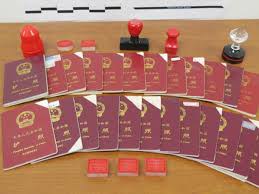A report released Tuesday by Canada’s Auditor General has determined the federal government has not been adequately detecting and preventing citizenship fraud, an issue that has arisen recently in Richmond.
According to the report, Immigration, Refugees and Citizenship Canada “did not have a systematic method of identifying and documenting fraud risks in the Citizenship Program and did not verify that the measures it implemented to detect and prevent fraud were working as intended.”
The three most common reasons for revoking citizenship eligibility are fraud related to residency, identity, or undeclared criminal proceedings.
The report highlights the likelihood that more instances of citizenship fraud cases exist, such as that involving an unlicensed Richmond immigration consultant who altered passports and documents.
In November, Xun “Sunny” Wang pleaded guilty to eight charges in connection to his businesses: New Can Consultants Ltd. and Wellong International Investments.
In B.C. Supreme Court, it was found that Wang’s companies procured approximately $10 million from 1,200 people in exchange for fraudulent immigration services over the course of several years.
His work was widespread throughout China, as the passports came from 243 different cities.
“The work typically involved helping clients obtain and maintain permanent residence status and/or Canadian citizenship,” stated Judge Reg Harris.
In many cases, Wang falsified the amount of time a Chinese citizen had spent in Canada in order to meet the standards of permanent residency. Wang often altered stamps or added new ones to his client’s passports.
Auditor General Michael Ferguson noted in his report that his office “observed inconsistent practices for dealing with suspicious documents.”
The report also notes how some citizenship applicants have been falsifying their home addresses in an illegal manner.
For example, the report notes one address was used by at least 50 different applicants during overlapping time periods between 2008 and 2015. Of those applicants, seven became citizens.
“When people are supplying the same address over overlapping periods of time, it could be an indication that there could be an attempt to get citizenship through fraudulent means,” said Ferguson.
The Auditor General also didn’t mince words in his report that highlights the fact the immigration department, along with the RCMP and Canada Border Services Agency, failed to adequately share information with one another.
For instance, Ferguson’s office found the RCMP does not systematically track citizenship status. Working backwards, the Auditor General tracked criminal occurrences that included keywords “permanent resident” and “foreign national.”
Taking a random sample of 38 out of 2,576 cases since 2010 involving criminal cases whereby such individuals had committed a serious crime, it was found that the RCMP shared information with the department in just two cases.
Hon. John McCallum, Minister of Immigration, Refugees and Citizenship, said his department would work to remedy the problems.



